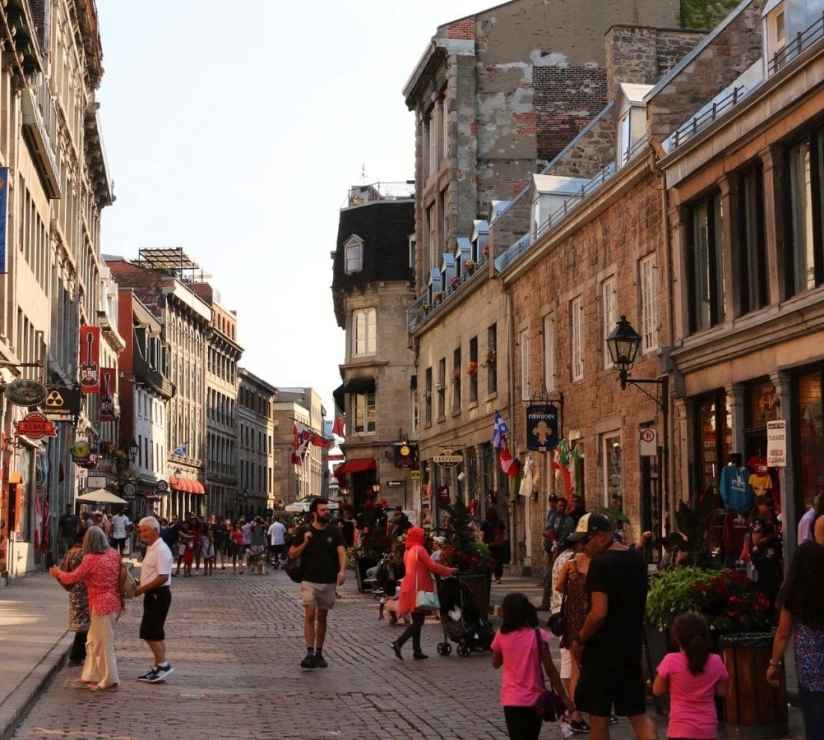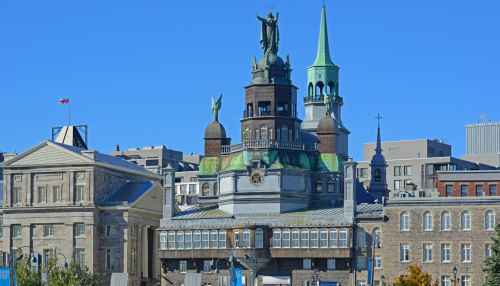Patrick my guide went to a lot trouble to cover the areas of interest I had specified in advance, which made for a perfect and comprehensive introduction to Montréal City culture and history.Martin, Montreal, 2025
Table Of Contents
- What to Eat in Montreal: Iconic Dishes You Can't Miss
- Best Restaurants for Montreal's Iconic Dishes
- Exploring Montreal's Food Markets
- Practical Tips for Eating in Montreal
- Frequently Asked Questions: What to Eat in Montreal
- Conclusion: A Culinary Adventure Awaits in Montreal
I still remember biting into my first Montreal smoked meat sandwich at 2 AM on Saint Laurent Boulevard in January, snow falling, steam rising from the warm rye bread. That moment changed how I understood food. Montreal doesn't just feed you, it tells you stories with every bite. After 15 years here, the best meals I've had happened in places doing one thing perfectly for generations.
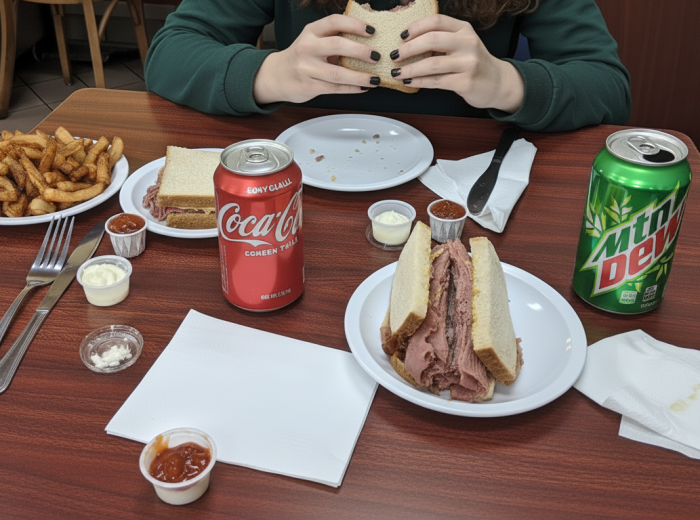
A cozy Montreal deli with a freshly made smoked meat sandwich
Food here reflects something deeper. Jewish immigrants brought bagel recipes from Eastern Europe and kept wood-fired ovens burning for a century. French-Canadian families passed down tourtière recipes. Proper poutine can fix a broken heart at 3 AM, and smoked meat connects you to generations who stood in the same deli lines. Walk through any neighborhood and you move between food traditions, bagels from St-Viateur, smoked meat from century-old delis, and fresh bread from Jean-Talon Market. A $12 sandwich matters as much as a $200 tasting menu here, and locals argue about bagels with genuine passion. These Montreal experiences define the city's identity in ways that go far beyond typical tourist attractions.
Looking for a private city experience in Montreal?
Explore the city with a local who plans a private day just for you; no groups, no scripts.
What to Eat in Montreal: Iconic Dishes You Can't Miss
These dishes define Montreal, the foods I've eaten hundreds of times and still crave every time I leave town. Some traveled here with immigrants who rebuilt their lives in a new country. Others evolved from Quebec's French-Canadian roots. All of them tell you something essential about this city and why food matters here more than almost anywhere else I've been.
Montreal-Style Bagels: A Unique Twist on Tradition
Every Sunday for a decade, I've walked to St-Viateur Bagel around 6 AM when bakers pull sesame bagels from the oven and the street smells like honey and toasted seeds. I grab six, still warm, and eat one on the sidewalk. That weekly ritual has become essential. Montreal-style bagels are smaller than elsewhere, denser, with slight sweetness from honey water baths before baking. The hole is comically large. The crust has this particular crackle, and the interior is chewy in a way that explains why people have lined up since 1957.
St-Viateur Bagel and Fairmount Bagel (opened 1919) represent Montreal bagel culture's two poles, and locals will fight you over which is better. Both run 24 hours, and both use wood-fired ovens. You can watch bakers hand-roll dough, dunk it in honey water, then slide it into ovens that have been hot continuously for decades.

Baker pulling fresh sesame bagels from a wood-fired oven, steaming hot and golden
Most tourists get bagels with cream cheese and smoked salmon, which is fine. But try this: get a sesame bagel fresh from St-Viateur Bagel or Fairmount Bagel, still warm, and eat it plain. That's the pure experience. The best bagels cost $8 per dozen. Both shops stay packed at all hours, 4 AM after concerts, noon on Christmas, and 7 AM on Tuesdays. That consistency, that commitment to doing one thing perfectly, is deeply Montreal.
Montreal Smoked Meat Sandwich: The Deli Tradition
The first time I brought someone to Schwartz's Deli, they couldn't understand waiting 45 minutes for a sandwich. Then they took their first bite, and I watched their faces change. That's the conversion moment. That's when you understand what Montreal has protected all these years.
Schwartz's Deli opened in 1928, and the tiny restaurant on Saint Laurent Boulevard has barely changed. You wait outside regardless of the weather. You sit at cramped communal tables. And the Montreal smoked meat, medium fat (the only correct way), arrives piled impossibly high between rye bread. The meat is tender but substantial. The spice blend hits your taste buds with perfect pepper, garlic, and smoke. The mustard is bright yellow and sharp. Around $15 for a sandwich, remarkably reasonable.
But Main Deli, four blocks away, serves smoked meat that's equally exceptional. I've been going there since my first year in Montreal, when their $12 meat sandwich could sustain me through an entire day. The owner recognizes me now. The meat at Main Deli is sliced slightly thicker, and some people (myself included on certain days) prefer it.
The debate between Schwartz's Deli and Main Deli is eternal, like bagels or hockey teams. I've stopped picking sides. Instead, I appreciate that Montreal supports multiple places doing the same thing at this level. Both attract lines. Both are worth every minute. What draws me back is continuity. These delis represent Jewish immigrant culture from the early 20th century, preserved as living restaurants. When I eat smoked meat at Schwartz's Deli, I'm eating the same sandwich that Jewish immigrants from Eastern Europe ate in 1930.
Poutine: The Comfort Food of Quebec
I've eaten poutine everywhere, in fancy restaurants charging $30 for "elevated" versions, and I keep returning to the simple truth: the best poutine is classic poutine, done right. La Banquise understands this better than anywhere.
La Banquise is open 24 hours, serving over 30 Montreal poutine variations. Their classic poutine (which I've eaten 200 times) demonstrates fundamentals perfectly. Crispy fries holding up under gravy. Fresh cheese curds from Quebec that squeak when you bite them. Brown gravy is poured hot enough that curds start melting, but don't dissolve completely.

Steaming poutine with crispy fries, melting cheese curds, and rich brown gravy
My favorite at La Banquise is their smoked meat poutine, combining two Montreal icons. But I tell first-timers to start with classic poutine. The place is unpretentious, with vinyl booths, bright lighting, and a menu on the wall. Expect $10-15, expect weekend waits, expect to leave satisfied.
Montreal poutine exists beyond La Banquise. Chez Claudette serves traditional poutine in an environment that feels like your Quebec grandmother's house. Most restaurants include poutine because locals demand it. What draws me to poutine isn't just the taste, it's the democratic nature. Rich people and broke students eat the same poutine at La Banquise. Poutine doesn't care about status. That's very Montreal.
Tourtière: The French-Canadian Meat Pie
Every Christmas Eve for eight years, I've gone to my friend Marie-Claire's family dinner, and every year her mother serves tourtière that makes me understand why this dish has survived generations. The crust shatters when you press your fork through it. The filling (ground pork, sometimes ground beef, with cinnamon and cloves) is warm and comforting beyond simple hunger.
Tourtière represents French-Canadian Montreal food culture, Quebec traditions that existed before bagels and delis. This meat pie shows up at every holiday table, but some restaurants serve it year-round. Au Pied de Cochon serves a version honoring tradition while adding signature richness. It's expensive, $100 per person with wine, but chef Picard's approach to Quebec ingredients creates experiences worth saving for.
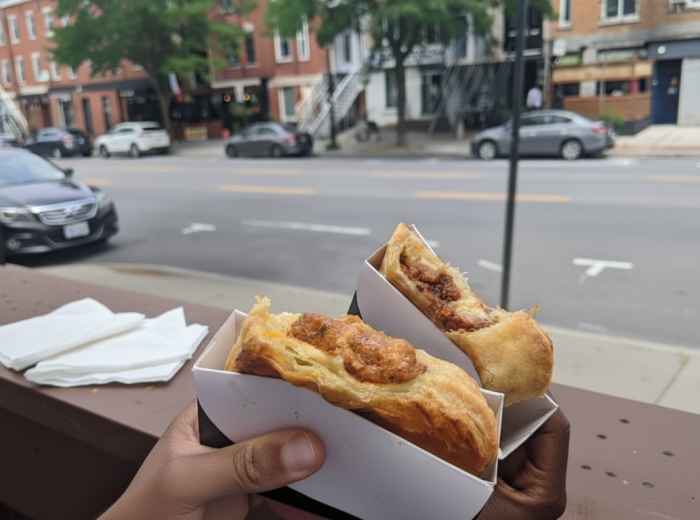
Golden, flaky tourtière with a tender, aromatic filling of ground pork and spices
Joe Beef in Little Burgundy serves tourtière during Quebec-focused menu periods, and eating there feels like being welcomed into someone's very delicious home. The restaurant seats maybe 30, reservations are essential. Expect $150-200 per person for a full dinner with wine. When they serve tourtière, you're getting their interpretation of family recipes, elevated but recognizable.
Crêpes and Galettes: A French Influence on Montreal's Culinary Culture
Montreal's connection to France goes beyond language. It's in how we approach food, structure meals, and take time with eating. Nowhere is this clearer than in crêpe culture. Sweet crêpes filled with Nutella or berries satisfy dessert cravings. Savory buckwheat galettes folded around ham, cheese, and eggs make proper meals.
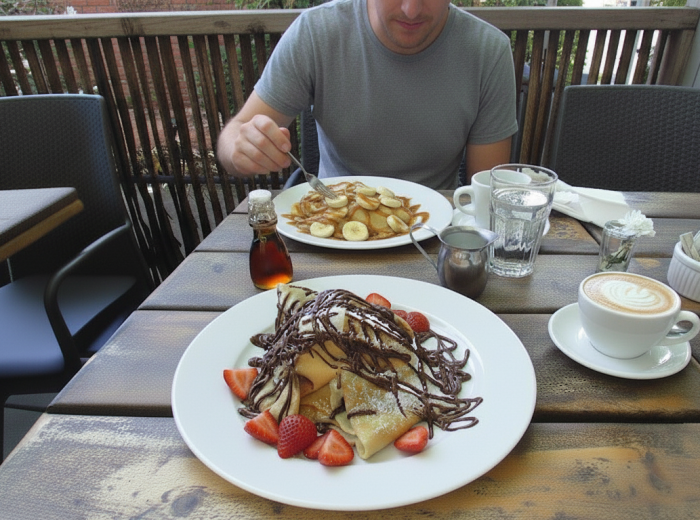
Delicate crêpes with fresh strawberries and Nutella
The skill comes in cooking the crêpe itself, thin, delicate, with slightly crisp edges. I eat crêpes in Mile End, where crêperies sit alongside bagel shops, in this beautiful collision of French and Jewish food cultures. I eat them downtown Montreal after museums. The French-inspired dishes scattered across Montreal menus trace back to the same culinary DNA, careful technique, respect for ingredients, and understanding that simple things done well beat complicated things done adequately.
Drogheria Fine proves how far Montreal will go for a single dish done with care.
Best Restaurants for Montreal's Iconic Dishes
After 15 years of eating through this city, these restaurants consistently deliver exceptional experiences beyond the iconic dishes. Among the many things to do in Montreal, eating at these spots should be at the top of your list.
Joe Beef
Joe Beef changed how I thought about restaurants. The restaurant sits in Little Burgundy, walls covered in wine bottles and vintage equipment. You need reservations weeks ahead.
What draws me back isn't just food, though their pork chop served with mashed potatoes might be the best thing I eat all year. It's the philosophy. Co-owners David McMillan and Frédéric Morin source obsessively from Quebec producers, change menus constantly based on seasonal ingredients, and cook French technique with Montreal sensibility. They serve foie gras next to seafood, next to vegetables prepared with the same care. Dinner costs $150-200 per person with wine, but you're paying for ingredients, skill, and meals you remember months later.
Arthur's Nosh Bar
Arthur's Nosh Bar is where I send people who want a modern take on Jewish comfort food. In Saint Henri on Rue Notre Dame Ouest, it feels like a neighborhood diner that happens to know exactly what it is doing. Brunch plates come loaded, schnitzel that hangs over the edge of the plate, latkes with crisp edges, thick cottage cheese pancakes, and smoked salmon piled on warm challah.
It is busy and loud in the best way, a room full of regulars, families, and hungover friends starting to feel human again. Prices stay reasonable for the quality, figure on forty to sixty dollars per person if you add drinks and dessert. Arthur's bridges generations, older Montrealers recognize the flavors, younger ones meet them for the first time, and the place never feels like a museum piece.
Drogheria Fine
Drogheria Fine in Mile End is the opposite of a long sit-down dinner, it is a tiny takeout window on Fairmount that serves one thing, gnocchi in tomato sauce. You walk up to the counter, hand over a few dollars, and they pass you a small paper carton filled with soft gnocchi coated in a rich, garlicky sauce. That is the whole menu, and it is all you need.
Most people eat standing on the sidewalk, leaning on parked cars, or carrying the carton down the street while the steam fogs their glasses. It is cheap, fast, and deeply satisfying, the kind of place locals hit on the way home or between bars. Drogheria Fine proves how far Montreal will go for a single dish done with care. It's one of those hidden gems in Montreal that locals guard jealously but always end up recommending.
Crew Collective
Crew Collective isn't primarily a restaurant, but the space alone is worth visiting. Housed in a former bank building downtown Montreal with soaring ceilings and ornate details, it reminds you that Montreal was once one of North America's most important cities. They serve coffee, pastries, and a light lunch. I work there sometimes, eating croissants under 40-foot ceilings. It's not expensive, $10-15 for breakfast, and demonstrates how Montreal preserves architectural heritage while adapting spaces for contemporary use.

People enjoying baked goods and coffee under soaring ceilings in a historic space
Because No Two Travelers Are the Same
We help you shape a city day that matches your pace, your style, and your curiosity, not a fixed route.
Find out howExploring Montreal's Food Markets
Every Saturday morning, I'm at Jean-Talon Market by 8 AM. The market in Little Italy is one of North America's largest public markets, and walking through it teaches you everything about Quebec's agricultural seasons and Montreal's multicultural food culture in an hour.
Summer at Jean-Talon Market is overwhelming. Quebec strawberries that taste nothing like grocery store versions. Tomatoes so ripe you eat them within a day. Corn so sweet it's good raw. I fill bags with produce, stop at cheese vendors for Quebec cheddar, and grab rotisserie chicken from prepared food stalls.

The entrance to the Jean-Talon Market, showcasing seasonal ingredients
Fall brings apples, squash, and root vegetables. Winter markets are smaller but operational. Spring brings asparagus, ramps, and first greens. Tourists in hotel rooms can still participate. Buy fresh bread, local cheese, smoked salmon, and sit at picnic areas for one of the best lunches possible. The market operates year-round. Entry is free.
Atwater Market near the Lachine Canal offers a similar but smaller experience. Both let you see how Montreal eats, what ingredients matter to local cooking, and how seasonal ingredients drive restaurant menus.
Montreal's food truck scene has exploded over the past decade. Summer brings trucks to Old Montreal, downtown Montreal, parks, and food festivals. The variety reflects Montreal's multicultural reality, Peruvian, Korean, Lebanese, and Quebec comfort food, all parked together. Great food for $12-15, no reservations needed. Download the "Street Food Montreal" app or check social media to find locations.
Taste Montreal Like A Local
Let a City Unscripted host design a Montreal food crawl around you, from bagels and markets to late-night poutine, not a scripted tour.Practical Tips for Eating in Montreal
Here's what you need to know to navigate Montreal's food scene like a local.
Getting Around Montreal
- Most iconic Montreal restaurants are concentrated on Saint Laurent Boulevard and in Mile End.
- The best strategy is exploring on foot, stopping at bagel shops, delis, and markets along the way.
Restaurant Timing and When to Visit
- Montreal restaurants often close between lunch and dinner service (2-5 PM).
- Plan accordingly or hit markets and food trucks during off-hours.
- Schwartz’s Deli and St-Viateur Bagel are best during off-peak hours (mid-afternoon or very late night) to avoid crowds.
- Jean-Talon Market is best before 10 AM on weekends when produce is freshest and crowds are manageable.
- Summer (June-August) brings peak market produce and outdoor terraces; winter is ideal for comfort food like poutine and tourtière.

Montreal’s Jean-Talon Market, showcasing fresh produce
Tipping, Payment, and Ordering Like a Local
- Tipping 15-20% is expected at sit-down restaurants in Montreal.
- No tipping at bagel shops or takeout counters.
- Many iconic spots prefer cash, but most accept cards now.
- Book Joe Beef, Au Pied de Cochon, and other high-end spots weeks in advance, especially for weekend dinners.
- Schwartz’s Deli and La Banquise serve generous portions, so come hungry.
- While most servers speak English, attempting French (even just “Bonjour” and “Merci”) is appreciated.
- Try multiple versions of iconic dishes: sample both St-Viateur and Fairmount bagels, and both Schwartz’s and Main Deli to form your own opinion in Montreal's eternal food debates.
Frequently Asked Questions: What to Eat in Montreal
1) What is the most famous food in Montreal?
The three iconic foods are smoked meat, bagels, and poutine. These foods are famous because they're genuinely delicious and represent the immigrant communities that built this city.
2) Where can I try the best Montreal smoked meat?
Schwartz's Deli is most famous, and the meat sandwich there lives up to its reputation despite crowds. Main Deli serves equally exceptional smoked meat with less chaos. Both cost around $15.
3) What is poutine, and where can I find the best poutine?
Poutine is fries, cheese curds, and gravy. La Banquise serves the best version, 24 hours a day, with over 30 variations. Real poutine uses fresh Quebec cheese curds that squeak when you bite them.
4) What other foods should I try in Montreal?
Seek out tourtière at Au Pied de Cochon or Joe Beef, get soft serve ice cream in summer, eat smoked salmon on a Montreal bagel with cream cheese, and visit Jean-Talon Market for fresh produce.
5) Is Montreal a food lover's paradise?
Absolutely. Montreal combines deep culinary traditions, access to excellent Quebec seasonal ingredients, and a culture that takes food seriously without being snobby. You can eat incredibly well, spending $10 on bagels or $200 at Joe Beef.
Conclusion: A Culinary Adventure Awaits in Montreal
When I taste a warm bagel from St-Viateur at 6 AM, bite into smoked meat at Main Deli on Tuesday afternoons, or eat poutine at La Banquise after midnight, I'm reminded why Montreal became my home. This city rewards curiosity and appetite, and the best meals often come from the simplest places, century-old bagel shops, cramped delis, 24-hour poutine joints.
Come hungry, come curious, and Montreal will show you exactly why we're a food lover's paradise. The wood-fired ovens are always hot, the delis are always slicing meat, and someone's always arguing about which bagel shop is better. Every meal tells a story here, from tourtière recipes passed down through generations to smoked meat sandwiches that taste exactly like they did in 1930. These Canadian experiences are unlike anything you'll find elsewhere, rooted in immigrant traditions and Quebec's distinct culinary identity.

Warm, fresh bagels at St-Viateur, steaming smoked meat sandwiches, and classic poutine
Your next trip to Montreal should include all the famous spots, Schwartz's Deli for smoked meat, St Viateur Bagel for bagels fresh from the oven, and La Banquise for poutine at any hour. Then wander through Jean Talon Market on Saturday mornings, try food trucks in Old Montreal, sit at wine bars in Mile End, and let the city feed you the way it has fed generations before you. That is Montreal, hungry, loud, and always ready with one more plate.
More Tastes of Montreal
Ready to Plan Your Perfect Day in Montreal?
Start your experienceWhat if Your Day in Montreal Was Planned by Someone Who Knows It — and You?
City Unscripted matches you with a local host who creates a private experience based on your interests, not a set route.
Explore With UsImagine Experiencing This for Real
A local can show you the vibe, flavors, and hidden gems up close.
Meet Your Montreal Hosts
A personalized way to explore Montreal’s must-see landmarks beyond the tourist crowds.
